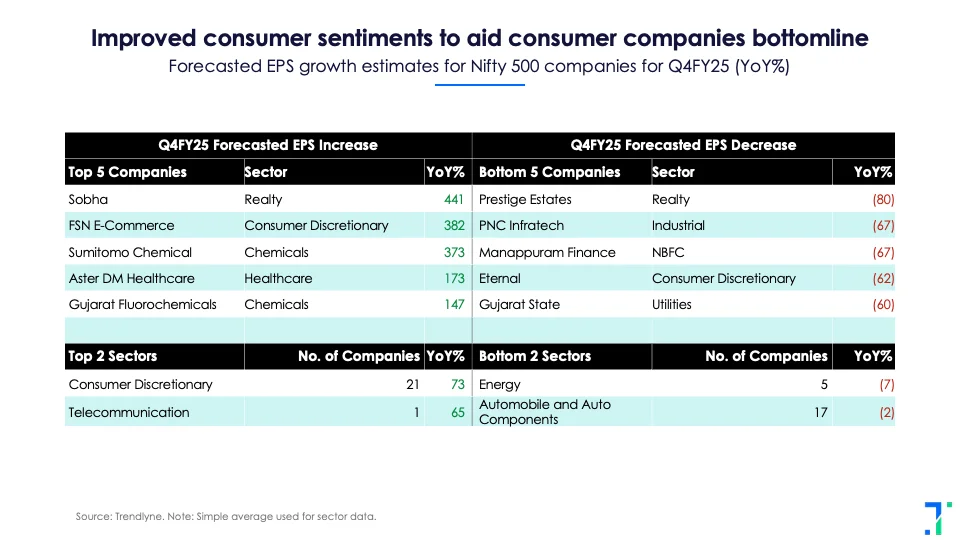
1. TVS Motor Company:
This two-wheeler manufacturer rose 1.6% on May 2 after reporting a 16% YoY increase in total sales for April 2025. The company sold 3.8 lakh vehicles during the month, driven by a 59% jump in electric vehicle (EV) sales. Exports grew 45%, while three-wheeler sales rose 50% YoY.
In Q4FY25, TVS Motor's electric scooter sales rose 55% YoY. The company’s revenue jumped 17.5%, supported by a 16% rise in volumes to 12.2 lakh units. Net profit saw an impressive spike of 75% during the quarter. Both revenue and net profit beat Trendlyne Forecaster estimates.
The company benefited from raw material costs coming down to about 69.3% of sales, compared to 72.8% in Q4FY24. It reported an EBITDA margin of 14% in Q4, which includes the full-year PLI benefit booked during the quarter. Export growth was strong in Latin America and Asia, while African markets were slower due to inflation and currency issues. TVS Motor’s overall market share increased by 160 bps YoY to 20.4%.
The company’s investments rose to around Rs 4,000 crore in FY25, up from Rs 2,450 crore in FY24. Of this, about Rs 500 crore went to TVS Credit Services, its non-banking finance subsidiary, which added over 40 lakh new customers during the year, taking the total to 1.9 crore. A significant portion also went to Norton, its premium motorcycle brand, where new product launches are expected by Q4FY26.
Regarding the demand outlook, CEO K N Radhakrishnan said that the company expects domestic two-wheeler demand in FY26 to remain steady, similar to FY25, driven by the ongoing need for vehicle replacements. He added, “A 50 bps cut in the repo rate, leading to lower EMIs, more wedding dates, and a normal monsoon will drive positive sentiment. May and June are expected to see a boost due to the wedding season.”
Post results, Anand Rathi has assigned a ‘Buy’ rating. The brokerage expects 7% CAGR in domestic 2W volumes from FY25-27, driven by rising EV adoption, replacement demand, and easy access to finance. They believe investments in TVS Credit Services, Norton, e-cycles, and TVS Digital will materialize over the next 1-2 years.
2. CEAT:
This tyre manufacturer surged 9.5% over the past week following the announcement of its annual result. In Q4, the company reported 14.4% YoY revenue growth, surpassing Forecaster estimates by 3%, driven by both volume and price increases. However, net profit came 8% lower compared to the same period last year and missed estimates by 12% due to elevated rubber prices.
CEAT gets the majority of its revenue from the replacement market, while 28% comes from OEMs and 19% from exports. Within its portfolio, tyres for trucks, buses, and two- and three-wheelers account for 60% of total revenue. CEO Arnab Banerjee expects falling crude prices to help offset the impact of high rubber costs and projects gross margins to improve to over 40%, up from 37.5% in Q4.
Banerjee also highlighted that rural demand outpaced urban by 4–5% in Q4, a trend he expects to continue in the current quarter. Over the long term, the company anticipates the domestic tyre industry to grow at a CAGR of 6–7%, while exports are projected to grow at 10–11%.
Integration of Camso, an off-road tyre and tracks company that CEAT acquired from Michelin in December last year, is on track for completion by Q2FY26. This move is likely to increase export revenue to 25%, up from the current 19%. Notably, about 30% of Camso’s exports to the US originate from Sri Lanka, which faces a 44% tariff. However, management notes that tyre tracks, which constitute nearly 50% of US-bound exports, attract only a 4% duty.
Motilal Oswal maintains a ‘Buy’ rating on the stock, viewing the replacement segment as the key growth driver. Analysts at Motilal believe that CEAT’s focus on 2W, passenger car and off-road tyre segments will boost margins and lower its dependence on the truck segment.
3. Maruti Suzuki India:
This car manufacturer fell 1.7% on April 25 following the announcement of its Q4FY25 results. Maruti Suzuki India’s net profit declined 1% YoY to Rs 3,911.1 crore, missing Forecaster estimates by 3.8%. The dip in profit was driven by higher discounts on small cars, increased marketing expenses, and costs related to the launch of its first electric vehicle, the e-Vitara SUV.
During the quarter, the operating margin contracted 210 bps to 8.7%. This was due to higher overheads, increased steel costs and start-up expenses for the new Kharkhoda plant, which began commercial production in March 2025. The Kharkhoda plant in Haryana adds 2.5 lakh units to Maruti's annual production capacity, bringing the total to 26 lakh units. The plant has the potential to scale annual capacity up to 10 lakh units.
Maruti Suzuki’s revenue grew 6.4% YoY to Rs 40,920.1 crore, aided by a 2.8% increase in domestic sales volume, totalling 5.2 lakh units. Segment-wise, the compact segment (Baleno, Swift, WagonR) grew 1.9% YoY, while the mini segment (Alto, S-Presso) declined 14.9% YoY. The mid-size segment (Ciaz) saw growth of 77.2% YoY.
Looking ahead, the company expects strong export momentum, targeting at least 20% YoY growth in exports for FY26, supported by demand in Latin America and Africa. Maruti Suzuki currently constitutes nearly 43% of India's total vehicle exports.
One of the key growth drivers for exports for FY26 is expected to be the e-Vitara. Rahul Bharti, Chief Investor Relations Officer, said, “We expect to do a volume of about 70,000 units annually of e-Vitara in FY26, and a large part of it will come from exports.”
Commenting on the future market outlook, Senior Executive Officer of Marketing and Sales, Partho Banerjee, said, “The PV industry is expected to grow by around 1-2% and fundamentally, we are not expecting very high growth in the automotive industry.”
Post results, Motilal Oswal reiterated its ‘Buy’ rating, citing exports as a key growth driver. The brokerage expects the company’s export volumes to reach 7.5- 8 lakh units by FY31 and has given a target price of Rs 13,985.
4. Trent:
This department stores company declined by 4.8% after it announced its Q4FY25 & full year results on April 29. The company’s Q4FY25 net profit declined by 36% YoY to Rs 318.2 crore due to higher inventory & depreciation expenses. However, its revenue increased 27.2% YoY driven by strong performance in its fashion brand 'Zudio'. The stock appears in a screener for stocks which have given consistent high returns over 5 years.
The company beat the Trendlyne forecaster Q4FY25 revenue estimate by 4.1% and the net profit estimate by 7.3%. Driven by store optimization efforts that boosted EBITDA margins by 101 bps to 16% YoY, the company strategically grew its store network. They added a net of 10 Westside locations, reaching 248 in total, and significantly expanded their Zudio presence with 130 new stores, now totaling 765. This growth supports Trent’s strategy of deepening its reach in metro and Tier-1 cities while boosting performance in important micro markets.
Noel N Tata, Chairman of Trent, said, “Given business seasonality, real estate dynamics, and our inventory approach, full-year results better reflect performance across revenue, profitability, and expansion than any single quarter. Our fashion portfolio remains distinct through clear choices and discipline. In FY25, Zudio surpassed $1 billion in revenue. In the Star business, we’re leveraging Trent’s model, with own brands contributing over 70% of revenue. ”
Axis Securities has maintained a ‘Buy’ rating on Trent, citing the company’s strong revenue growth despite macroeconomic challenges. The brokerage highlights that the recent stock price correction presents an attractive entry point for long-term investors. With structural tailwinds in organized retail and significant room for market share expansion, Trent is well-positioned to capitalize on the sector’s long-term growth. However, it has revised its target price downward to Rs 6,650, factoring in increased competitive intensity.
5. Persistent Systems:
This IT consulting & software company has risen 5.2% over the past week after its Q4FY25 net profit grew 6.1% QoQ to Rs 395.8 crore. Revenue increased 5% QoQ to Rs 3,260.5 crore owing to improvements in the banking, financial services & insurance (BFSI), healthcare & life services, and software, hi-tech & emerging industries segments. The stock features in a screener of stocks with increasing revenue over the past eight quarters.
The company’s revenue and net profit beat Forecaster estimates by 0.8% and 0.3%, respectively. North American, Indian, and European business also improved on the back of client wallet expansion and deeper penetration across existing accounts. Its highest contributing segment, software, hi-tech & emerging industries (contributing 40.9% of revenue), improved during the quarter, thanks to increased traction in product engineering mandates, platform modernisation, and AI-led productivity initiatives.
The total contract value (TCV) of the company grew 15.6% YoY to $ 517.5 million (~ Rs 4,361.7 crore) on the back of new bookings of $ 329 million (~ Rs 2,773 crore) during the quarter. However, the TCV declined 12.9% QoQ due to the quarter being seasonally weak. Additionally, the US Department of Government Efficiency (DOGE) and United States Agency for International Development (USAID) implemented cost rationalization initiatives, which impacted several provider and payer clients.
Speaking on the company’s aspirations, Sandeep Kalra, Executive Director and Chief Executive Officer, states, “We target to reach $2 billion in annual revenues by FY27, with a longer-term goal of $5 billion by FY31. We are confident in achieving these targets through strategies tailored to both organic growth and potential acquisitions.”
Post results, KR Choksey upgrades Persistent Systems to a ‘Hold’ rating from ‘Reduce’, with a target price of Rs 5,324 per share. The brokerage is confident in the stock due to its strong Q4FY25 execution, a healthy deal pipeline, and platform-led operating leverage. However, \macro risks like geopolitical uncertainty, tariff overhang, and an elongated deal cycle are rising across the industry. The brokerage expects the firm’s revenue to grow at a CAGR of 19.3% over FY25-27.
Trendlyne's analysts identify stocks that are seeing interesting price movements, analyst calls, or new developments. These are not buy recommendations.













